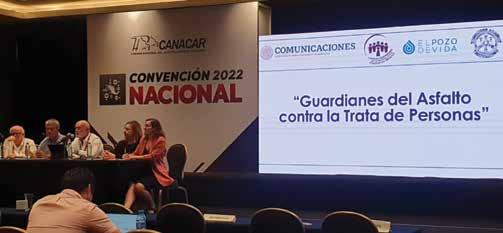
3 minute read
Updates from Mexico CMV Inspections Conducted by Fox Creek Protective Services
UPDATES FROM
Mexican Inspectors Participate in CVSA’s 2022 North American Inspectors Championship
The CVSA North American Inspectors Championship (NAIC) recognizes and awards commercial motor vehicle inspector excellence in North America. After being cancelled the last two years due to the pandemic, this year the championship took place Aug. 15-19 in Indianapolis, Indiana.
On behalf of Mexico, Inspector Luis Leon Merino Gomez and Inspector Jacobo Alejandro Garcia Arias — both experts in specialized cargo verification of hazardous materials, general cargo, passenger and tourism and verification units — had the opportunity to participate in NAIC, representing the General Directorate of Federal Motor Transport (DGAF) of the Ministry of Infrastructure, Communications and Transportation (SICT).
During the championship, Inspector Merino obtained the highest score for Mexico. CVSA Mexico Liaison Rodolfo Giacoman said about the Mexican competitors: “Both stood out during the competition with their knowledge of the regulations, professionalism in carrying out inspections, first-class equipment, punctuality, teamwork and social intelligence that exceeded cultural and language boundaries.”

Mexico Participates in CVSA’s Brake Safety Week
On Aug. 21-27, Mexico participated in CVSA’s annual Brake Safety Week campaign, which focuses on the inspection, compliance and training of drivers of commercial motor vehicles on federal highways.
During the campaign, 209 federal inspectors, distributed in 43 fixed size and weight centers and one passenger terminal, reviewed the brake systems in commercial motor vehicles in accordance with the provisions of the Official Mexican Standard NOM-068-SCT-2-2014. This initiative helps identify the most recurrent problems in commercial motor vehicles in an effort to promote road safety and crash prevention.
Government Officials Gather for North American Strategy on Sustainable Transportation: Zero-Emission Vehicle Deployment Meeting

On Aug. 24, the North American Strategy on Sustainable Transportation: Zero-Emission Vehicle Deployment meeting brought together government officials from Mexico, the United States and Canada to discuss the best practices and initiatives in the North American region regarding the production of electric vehicles. The meeting resulted in: • Concluding that there is a need to convene bi-monthly meetings to discuss progress in the adaptation of zero-emission vehicles (ZEV) • Identifying government agencies, offices and points of contact for all aspects of the ZEV ecosystem in each country • Sharing of experiences and best practices in the adoption and transit of zero-emission buses for cities and provinces • Designing of a practical guide for companies willing to adopt light- and medium-duty ZEVs called ZEV toolkits
The initiatives discussed at this meeting seek to address future trends, applications and developments in ZEV technologies in North America.



On Sept. 8, a collaborative agreement for the prevention of human trafficking on Mexican roads and highways was signed in Cancún, Quintana Roo, during the 22nd National Convention of the National Chamber of Cargo Transportation (CANACAR).
Signatories were El Pozo de Vida President Iliana Ruvalcaba; Citizen Council for Security and Justice of Mexico City President José Salvador Guerrero; Truckers Against Trafficking Deputy Director Kylla Lanier; CANACAR Vice President José Refugio Muñoz; and DGAF International Affairs Director Salvador Monroy Andrade (on behalf of SICT).
This collaboration seeks to raise awareness among cargo and passenger operators, cargo companies, public officials and organizations in the transportation sector, with the goal of preventing the crime of human trafficking on Mexican highways.
With this collaborative agreement, the agencies involved will undertake training activities for cargo and passenger vehicle operators, citizens, public officials and companies and will establish policies and protocols focused on reporting instances of human trafficking and promoting the “Guardians of the Asphalt” initiative and the national hotline.
This agreement is expected to promote a civic culture and respect for human rights and highlight the professionalism and dignity of commercial motor vehicle drivers in federal transportation. n










